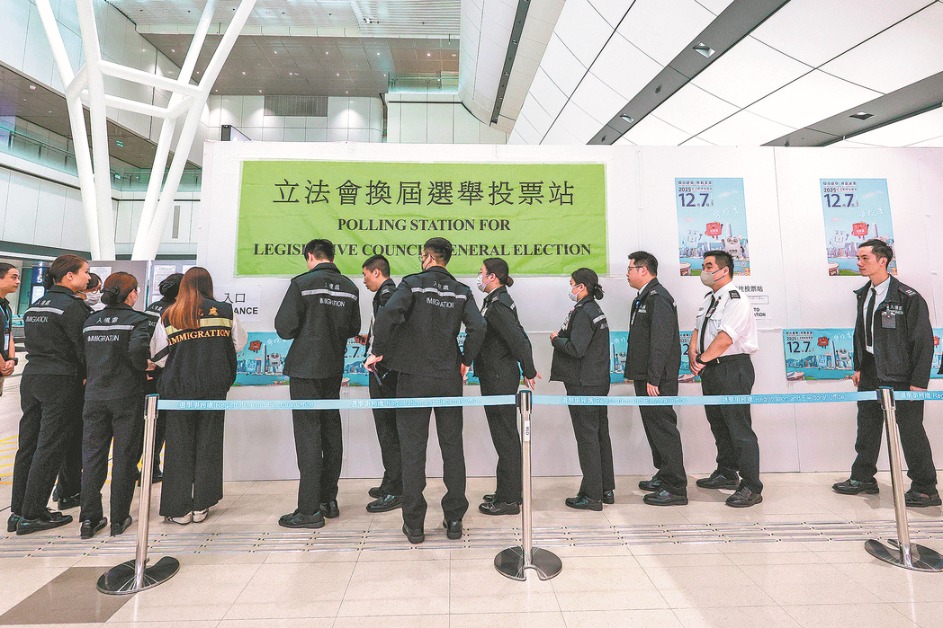Asian American voters lean toward Biden despite drop in favorability
By LIA ZHU in San Francisco | chinadaily.com.cn | Updated: 2024-07-12 22:58

Ahead of the 2024 presidential election, Asian American voters, a fast-growing demographic in the United States, appear poised to support Joe Biden despite a notable decline in favorability from 2020, according to the latest Asian American Voter Survey, which sheds light on a community whose political sway continues to grow amid neglect from mainstream political campaigns.
"Over half of Asian American voters view Joe Biden very favorably or somewhat favorably while just over one-third say the same for Donald Trump," said Karthick Ramakrishnan, executive director of AAPI Data, at the survey's news briefing on Wednesday.
"If the election were held today, Biden does better than Trump among Asian American registered voters," he said. However, Biden sees the biggest drop in vote share from 2020 whereas Donald Trump has a marginal gain, he added.
The survey shows 46 percent are likely to vote for Democratic candidate Biden, down 8 percentage points since 2020, while 31 percent are likely to vote for Republican candidate Trump, gaining 1 point since 2020.
On broader electoral preferences, Asian American voters strongly lean Democratic, with 51 percent favoring Democratic candidates for the US House compared to 30 percent for Republicans. A similar trend is observed in Senate races, where 50 percent express preference for Democratic candidates versus 30 percent for Republicans.
"There's not much difference when it comes to the Senate race and the House race, indicating that Biden is underperforming compared to a generic ballot for the US Senate and the US House," said Ramakrishnan.
The bi-annual survey, conducted jointly by APIAVote, AAPI Data, Asian Americans Advancing Justice (AAJC), and AARP, polled 2,479 Asian American voters across major ethnic groups, including Chinese, Indian, Filipino, Korean, Vietnamese and Japanese.
Since 2012, this multilingual survey has revealed what issues matter most to "this fastest growing part of the electorate" and how those issues are consequential to their voting decisions, said the groups.
Among the top concerns for Asian American voters, economic issues dominate, with 86 percent of respondents viewing jobs and the economy as "extremely" or "very" important.
Concerns over inflation and healthcare also stand out, as 85 percent indicate they are important issues. Crime and education follow closely behind, with 80 percent of respondents considering them crucial issues.
Social Security and Medicare are also significant concerns for 79 percent of Asian American voters, and 76 percent of respondents say that these topics alone are sufficient to motivate them to cast their ballots, irrespective of their feelings toward individual candidates.
Additionally, 68 percent of them express worries about hate crimes, harassment, and discrimination, issues that have increasingly influenced their political engagement.
In recent years, Asian Americans have emerged as one of the fastest-growing segments of the electorate, with their population projected to surpass 35 million by 2060, according to the Pew Research Center.
The population of Asian Americans has grown by 15 percent in the last four years alone and turned out in record numbers in every federal election since 2016. In 2020, a surge in Asian American voters – especially those voting for the very first time – in battleground states was crucial to Biden's victory, said the survey.
In 2020, almost 60 percent (7.6 million) of the Asian American of voting age turned out. In battleground states such as Arizona, Georgia, Nevada, North Carolina and Pennsylvania, the number of Asian Americans who cast their ballot in 2020 exceeded the presidential margin of victory.
For the upcoming elections in November, 90 percent of respondents express intent to vote, despite 42 percent not having been contacted by either the Democratic or Republican parties or candidates, according to the survey.
The findings mirrored the persistent oversight of Asian American voters by political campaigns despite their growing influence and decisive role in recent elections, said Christine Chen, executive director of APIAVote. Recent elections have shown that "when candidates make concerted efforts to engage them, Asian American voters are persuadable," she added.
John Yang, president and executive director of AAJC, echoed these sentiments, emphasizing the need for targeted outreach.
"Politicians too often overlook us in the civic engagement process, where in many cases, our right to vote is suppressed, compromised, or questioned. What this survey tells us is that politicians need to reach out to the Asian American community, and accurately understand and address our issues if they want to win our votes," said Yang.
























